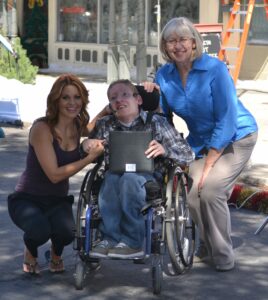In my last post, I shared a story of a friend who showed resilience after suffering a serious bicycle accident. It is an example of recovering from an acute stressor. And yet sometimes, even when no trauma is involved, life feels harsh and relentless. Just getting by day-to-day takes something out of us. So let me offer a story of someone who deals with chronic stress, a cousin whom I admire.
A Life-Time of Care-Giving
Chris has been in a care-giving role for most of her adult life. Not only did she and her husband raise a large family but her husband has a 30+ year history of heart attacks and strokes and so has
Chronic Stressors and Worries
I asked Chris to write down a list of her stressors or worries and then another list of ways she copes. Here is a summary of her stressors.
- She deals with continuous uncertainty regarding the health of her husband and son.
- She provides constant, daily care to the two of them making it difficult for her to get much time for herself. She can’t leave them alone.
- She worries about their finances, particularly how to provide for the end-of-life needs of her husband.
- Although Chris is bright and articulate, she tells me that she deals with feelings of stupidity which she believes stems from childhood trauma.
- She worries about dying and leaving their disabled son in the care of someone else.
- She wonders how to fill Ammon’s life with great experiences so he could feel joy and meaning.
- She added one more—her lack of patience—a big one, she claimed.
To give you a flavor for what she deals with, here is an excerpt from something she sent me regarding how she was feeling when her son, Ammon, was just 2 years of age. Imagine. It’s now another 24 years later and she’s lived with the same stressors these many years. But here is what she wrote:
A Personal Disclosure
“The first two years of life for a child with Spina Bifida are fraught with danger and anxiety. The doctors and parents aren’t sure exactly how responsive and active the child will be until they get a little older. Ammon had many, many surgeries in that first two years. To say I was always scared is putting it mildly. I had to keep my cool around our kids and keep reassuring them when I didn’t feel reassured at all. We had seven children living at home when Ammon was born. Jim had another TIA during the first year of Ammon’s life and was unable to perform the tasks required at his work so he lost his job.
Life was bleak and so heavy. I had never navigated such dangerous waters and I can’t remember a single time that I laughed during that period of time. I smiled a lot, hoping to buoy up my kids, but I never laughed.”
How Chris Copes with Her Chronic Stress
Like I said, this was 24 years ago. She has continued these many years since, experiencing realities much like those she described in this paragraph. So, I’ve asked her how she does it. What gives her the courage to carry on? Here is what she wrote:
- First and foremost is that I have faith in a loving, merciful God who knows me and knows my capabilities better than I know them myself. I could do nothing without that knowledge and trust. I would feel paralyzed with fear if I didn’t have that strength in my life on a daily and hourly basis.
- I find ways to laugh. I try to find ways to laugh through hard things. (In fact, she tells the story of a friend who sent her an email of jokes of people with disabilities when Ammon was just a few years old. She realized that this friend knew her very well and this was her way of getting her to lighten up and laugh. The only joke Chris could remember was, “What do you call a guy who likes to swim but has no legs or arms? Bob.” Rather than be offended Chris said she started to chuckle as she read this and other jokes and by the time she was done, tears were streaming down her face. She told me that it felt so good to laugh. It was so cleansing! And from then on, she tried to find humor whenever she could.)
- I rely on family and friend for support. I need someone in my life who can let me just spill (verbally vomit if you will) once in a while. I usually try not to do that to family because I don’t want them to worry excessively. But a good, supportive friend is a must in my life. And visits from family and friends mean so much. Just a 15-minute visit seems to do the trick, although longer is even better. But 15-minutes reassures me that people care about us.
- I seek knowledge. I try to gain as much knowledge as possible regarding health issues of Ammon and Jim. This medical knowledge gives me a feeling of power.
- I like serving others. It always makes me feel better when I serve others but it doesn’t happen as often as I would like because I seem to be trapped under the needs of my immediate family. I like to break out of the family service and do something for someone else when I can.
- I enjoy writing in a journal or something else. Getting feelings out on paper and verbalizing feelings and events helps. (By the way, I’ve read some of what Chris has written and she’s wonderfully articulate.)
- I make hobbies important. Photography got me through some stressful days at work when I’d walk during my lunch hour. It helped me focus on beauty so I could put my mind in a better place.
Seeing the Silver Lining
After sharing these ideas with me, Chris wrote, “Given all of this, I would not trade my trials with anyone else. Ammon has given me such incredible joy that I would go through it all again just to have him in my life. I’m grateful his health is stable. He is my rock, so calm and uplifting. Ammon always (!) takes the higher road and is a constant example to me how to be more God-like. So his difficulties have strengthened all of us and we will be forever grateful that God sent him to us.”
What About You?
Like Chris, I know many people live with chronic stress—poverty, illness, pain, job insecurity, abusive or unstable relationships, uncertainty about the future, social anxiety and rejection, even unfulfilled dreams. The list goes on.
So look at yourself. Do you deal with chronic stress or anxiety? What impact does it have on you? How do you cope? Is your tendency to deny and suppress it? Act it out in harmful ways?
Resilience is your ability to deal with the hard things in your life, including chronic stress. Although becoming more resilient doesn’t necessarily mean that hard things go away, it does mean that you become stronger and more able to handle them. So rather than waiting and hoping that things will get better, which they sometimes do, you can also grow in your inner strength and ability to hand the hard things of life.
Watch for my new course on Managing Stress and Building Resilience.



Chris is a super rock star and her story made me cry. It’s very humbling to read about her life. Her story makes me want to be more selfless.
Thanks for your comment, Joye. She is an example to me.
Wow!! That woman is shooting straight to the top when she dies!! I ‘joke’ that I hope a good friend or family member is at the pearly gates when I get there saying, “Please let Sandra in. She meant to be a good girl, and wanted to be nice!”
So true! I’m sure there will be plenty of people advocating for Chris.
Fascinating; inspiring. I detect in Chris’s story–and in hundreds of others I have worked with– a kind of expanding galaxy in the evolution of resiliency. Most seem to begin at a level of anxiety that “shocks” one into an altered perceptual framewok; gradually (or not) that initial perception yields to an acceptance and routine born of obligation and duty; a broader, more eternal view can arise for some (as noted in Chris’s story) that resilience comes at the level of love. Thanks, Roger.
I love your comment, Jessie. I agree there is a developmental process we go through as we deal with hard things and build resilience. Our response is not binary (resilient or not) but evolves as we accept the harsh realities of our lives and learn that we have options about how we respond (all a process of maturation).